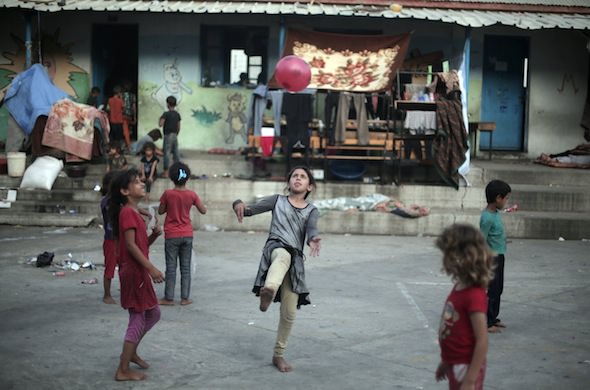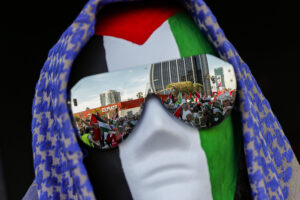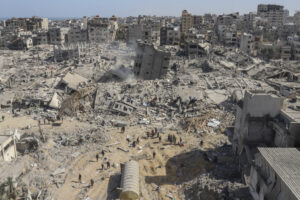Attitudes and Expressions From a Gaza Refugee Camp
At U.N schools-cum-shelters for displaced Gazans, exhausted refugees speak of grief, anger -- and some -- appreciable pride for the resolve with which fighters led by Hamas respond violently to Israel's blockade against the movement of people and supplies in and out of the territory and the assault of the past month.
At U.N schools-cum-shelters for displaced Gazans, exhausted refugees speak of grief, anger — and some — appreciable pride for the resolve with which fighters led by Hamas respond violently to Israel’s blockade against the movement of people and supplies in and out of the territory and the assault of the past month.
From a concrete courtyard in Jabaliya where side-by-side stalls are adorned with “colorful cloths,” “shoes are removed on entry,” and radio news about truces and cease-fires hold the attention of inhabitants, The New York Times reports:
After more than a month of war, the people of Gaza are sad, of course, at 1,900 lives lost. They are angry, too: at Israel for destroying some 10,000 homes, at the Arab leaders who seem unmoved, the Western ones who seem unable to move, and even, quietly, at the Palestinian militants who built tunnels under their neighborhoods. But mostly they are spent — from weeks of being stuck inside with scant hours of electricity and waiting in line for potable water, but also from years of feeling stuck in what they universally describe as a prison.
Steadfastness is perhaps the most valued trait in Gaza, and in long conversations with three dozen residents over three days, most insisted they could withstand much more to achieve their goals of opening borders and removing Israeli restrictions on imports and exports. They struggled to make a coherent case for how continued fighting against a far more powerful enemy might translate, politically, into these achievements. Yet they were proud of the performance of militants led by the Islamist Hamas faction, who managed to kill 64 soldiers, repeatedly penetrate Israel underground, and even briefly shutter the airport in Tel Aviv.
One 27-year-old who sees Hamas as having failed politically nonetheless described the tunnels through which Gaza gunmen attacked Israeli soldiers and “shook an entire society with new fear,” the Times states, as “genius.”
“I think they are brilliant, how they could manage to do this whole thing,” said Lima Diab, who is reported to be finishing a course in office administration. “They are well prepared, really, they think and work. Not just blah blah blah — they say and do.”
Ahmad al-Najjar, 44, whose work horse was killed in an Israeli attack and four small children, including a yet-unnamed baby born during the fighting, slept in the horse’s shed during the truce, was less admiring. He said he and his neighbors “do not allow the resistance to strike from here” and that the idea that Hamas might have built tunnels under their homes “bothers me.” He added that the fighting had only pushed Gaza backward from its goals.
“So far nothing has been achieved, we don’t know what they are doing there,” Najjar said of talks going on in Cairo. The Palestinian delegation there includes members of Hamas as well as the Fatah party of the president of the Palestinian Authority. “These are parties — Fatah, Hamas, Israel are parties. We are people. We are victims. If these parties have differences, why do we pay the price of their differences?”
Elsewhere, 32-year-old Suhair al-Najjar, who lost 30 relatives and her home in the Israeli campaign said, “I curse both sides.” After describing Hamas as “shoes” — “a sharp insult,” the Times notes — an older man walked over to scold her. “Don’t say ‘Hamas,’ say ‘the Arab leaders,’ ” he yelled.
Undeterred, she responded: “I’m angry at everybody, all the countries.” The man, who wore a gray jalabiya garment and a beard, moved closer and stormed: “You need someone to teach you how to talk?”
Read more here.
— Posted by Alexander Reed Kelly.
Your support matters…Independent journalism is under threat and overshadowed by heavily funded mainstream media.
You can help level the playing field. Become a member.
Your tax-deductible contribution keeps us digging beneath the headlines to give you thought-provoking, investigative reporting and analysis that unearths what's really happening- without compromise.
Give today to support our courageous, independent journalists.






You need to be a supporter to comment.
There are currently no responses to this article.
Be the first to respond.